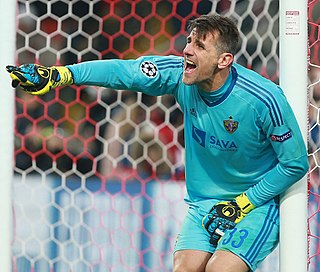
Doboj is a city in Republika Srpska, Bosnia and Herzegovina. It is situated on the banks of the Bosna river, in the northern region of Republika Srpska. As of 2013, it has a population of 71,441 inhabitants.

Bihać is a city and the administrative centre of Una-Sana Canton of the Federation of Bosnia and Herzegovina, an entity of Bosnia and Herzegovina. It is situated on the banks of river Una in northwestern Bosnia and Herzegovina, in the Bosanska Krajina region. In 2013 its population was 56,261.

Čapljina is a city located in Herzegovina-Neretva Canton of the Federation of Bosnia and Herzegovina, an entity of Bosnia and Herzegovina. It is located on the border with Croatia a mere 20 kilometres (12 mi) from the Adriatic Sea.

Lukavac is a city located in Tuzla Canton of the Federation of Bosnia and Herzegovina, an entity of Bosnia and Herzegovina. According to the 2013 census, the town has a population of 12,061 inhabitants, with 44,520 inhabitants in the city.

The Slovenia men's national basketball team represents Slovenia in international basketball competitions, and is managed by the Basketball Federation of Slovenia. Since the independence of Slovenia in 1991, the national team has competed at every EuroBasket, and reached the knockout stage at every championship since 2005. Their greatest achievement overall at the tournament came at EuroBasket 2017, where they won all nine games and became European champions.
Babić is a Croatian, Bosniak and Serbian family name. It is the 3rd most frequent surname in Croatia and is derived from the common Slavic word for grandmother or old woman: baba.

Bosniaks of Serbia are a recognized national minority in Serbia. According to the 2022 census, the population of ethnic Bosniaks in Serbia is 153,801, constituting 2.3% of the total population, which makes them the third-largest ethnic group in the country. The vast majority of them live in the southwestern part of the country that borders Montenegro and Kosovo, called Sandžak. Their cultural center is located in Novi Pazar.

Jasmin Handanović is a Slovenian retired footballer who played as a goalkeeper. He is the oldest player to ever play in the Slovenian top division.
Hadžić is a Bosnian surname, derived from the word hadži (hajji), referring to pilgrims to Mecca. Its bearers are predominantly Bosniaks. It may refer to:
Hodžić is a common family name found in Bosnia and Herzegovina, Montenegro, Croatia, Serbia and Slovenia. It is derived from the word hodža, meaning "master/lord", itself a Turkish loanword (hoca) of ultimately Persian origin (khawaja). Its literal meanings are "little hodža" or "son of the hodža".
Alen is an Armenian and Yugoslav given name and may refer to:

Serbs are, by large, first or second generation immigrants from other republics of former Yugoslavia. In the 2002 census, 38,964 people of Slovenia declared Serb ethnicity, corresponding to 2% of the total population, making them the largest ethnic minority in the country.
Halilović is a Bosniak surname. Notable people with the surname include:
Jasmina, sometimes Jasminka, as a feminine variant, and Jasmin, sometimes Jasminko, as a masculine variant, are given names used in Bosnia and Herzegovina, Croatia, Macedonia, Montenegro, Serbia, Bulgaria and Slovenia, and same as a given name Jasmine, which is the common form in German, Romance and English-speaking countries, although almost always as a feminine variation.
Bešić is a Bosniak surname. Notable people with the surname include:
Teoman "Teo" Alibegović is Bosnian-Slovenian former professional basketball player, coach, and manager. With 990 points scored, he is the second all-time top scorer of the senior Slovenian national basketball team.

Košarkarski klub Cedevita Olimpija, commonly referred to as KK Cedevita Olimpija or simply Olimpija, is a men's professional basketball club based in Ljubljana, Slovenia. The club competes in the ABA League and the Slovenian First League.












